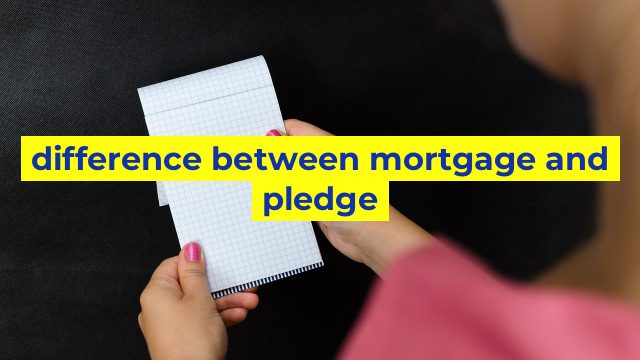The Difference Between Mortgage and Pledge
When it comes to financing your home or other types of assets, the terms “mortgage” and “pledge” often come up. Though these two concepts are often used interchangeably, they actually refer to different legal mechanisms with their own set of advantages and disadvantages. In this article, we’ll explore the key differences between a mortgage and a pledge to help you make an informed decision.
What is a Mortgage?
A mortgage is a type of loan that is used to finance the purchase of a property. When you take out a mortgage, the lender will lend you money to buy your home or commercial property, and you will agree to pay that money back over a set period of time, typically 15-30 years. In exchange, the lender will hold a security interest in the property, which means they have the legal right to take possession of the property and sell it if you fail to make your mortgage payments.
One of the main advantages of a mortgage is that it offers lower interest rates than other types of loans because the loan is secured by the property itself. However, getting approved for a mortgage can be difficult if you have poor credit or a low down payment.
What is a Pledge?
A pledge is another type of legal mechanism that is used to secure a loan. Unlike a mortgage, however, a pledge is not tied to a specific property. Instead, a pledge involves offering a valuable asset as collateral in exchange for a loan. This could include anything from jewelry to stocks and bonds.
When you pledge an asset, you are essentially saying that if you fail to pay back the loan, the lender has the right to take possession of the asset and sell it to recoup their losses. This means that pledging an asset can carry higher risks than a mortgage because you could lose more than just your property if you default on the loan.
Which is Right for You?
Choosing between a mortgage and a pledge depends on a variety of factors, including your financial standing, the size of the loan you need, and the specific assets you have available to pledge. In general, a mortgage is a safer option if you want to buy a property and are willing to commit to a 15-30 year repayment term. A pledge, on the other hand, can be a useful option if you need a smaller loan and have valuable assets to pledge as collateral.
When deciding between a mortgage and a pledge, it is important to consult with a financial advisor or other expert who can help you weigh the pros and cons of each option and find the best fit for your particular circumstances.
Table difference between mortgage and pledge
| Factor | Mortgage | Pledge |
|---|---|---|
| Definition | A legal agreement where a lender provides financing for a property and the borrower pledges the property as collateral. | A security agreement where a borrower pledges an asset as collateral for a loan but retains possession of the asset. |
| Types | Fixed-rate mortgage, adjustable-rate mortgage, interest-only mortgage | Secured line of credit, accounts receivable pledge, inventory pledge |
| Collateral | The property being financed | Can be any asset that the borrower owns, such as inventory or accounts receivable |
| Property ownership | The lender has a lien on the property until the mortgage is paid off | The borrower retains ownership of the pledged asset |
| Risk | The lender has a lower risk since the property serves as collateral | The lender has a higher risk since the pledged asset may not retain its value |
| Default consequences | The lender can foreclose on the property and sell it to recoup their losses | The lender can seize the pledged asset but may have a harder time recouping their losses if the asset is not worth enough |
